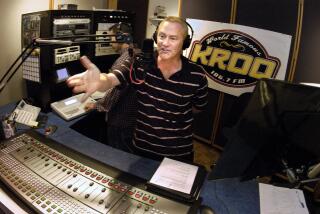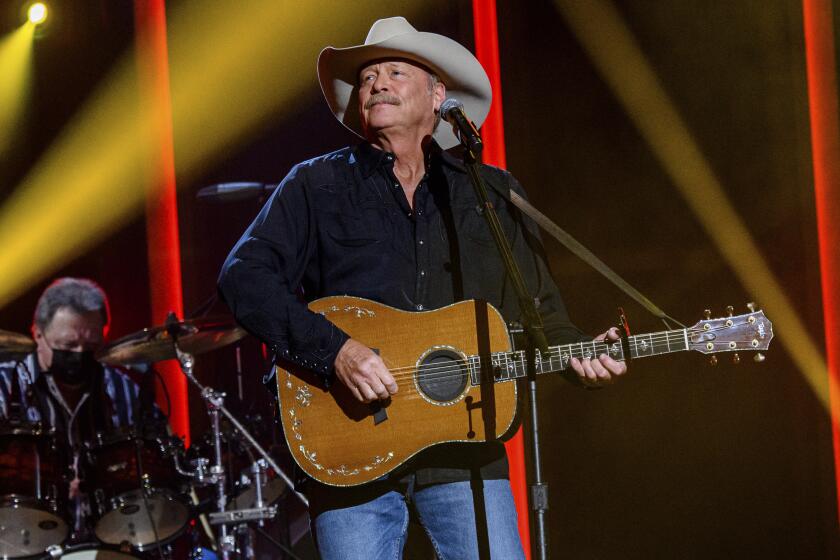KROQ IS BACK ON A ROLL AFTER YEARS OF ‘STATIC’ : Rick Carroll, Wunderkind of Radio Rock, Returns to His Old Haunts to Engineer Rebound in Ratings
- Share via
Before Rick Dees and KIIS-FM turned the rock-radio market upside down two years ago, KROQ Program Director Rick Carroll was Los Angeles radio’s Wunderkind. While he was on the job, KROQ’s ratings zoomed.
But when he left “The Roq of the ‘80s,” as KROQ dubs itself, and began hawking his programming sorcery to other stations, KROQ’s Arbitron ratings dropped like--excuse the expression--a rock. The top-rated rock station of spring, 1983, had become a rock ‘n’ roll not-so-golden oldie within a couple of years.
But the independent consulting business was neither so glamorous nor lucrative as Carroll had imagined, and by late last year he was back at KROQ. Never one to mix false modesty with the cold-facts measuring stick of the quarterly Arbitron ratings, Carroll concedes that it’s no coincidence that KROQ is making a comeback in large part because he is back running the show.
“(After) KROQ was on top, we were airing 14 and 16 minutes of commercials an hour because a lot more people wanted to advertise with us. And the jocks were talking forever,” Carroll said.
When he left, the deejay jabber and the commercials increased, while the one thing KROQ has always prided itself on decreased: new-wave pop that no one else was playing. Almost every other pop station in Los Angeles seemed to pick up Culture Club, Duran Duran and other Carroll “discoveries.” KROQ deejays played what they wanted and the Carroll discipline disappeared.
Now he’s back and, in less than a year, KROQ is poised for a challenge to the KIIS citadel, Carrol said.
“When I first came back,” he said, “there was a lot of criticism: ‘Rick’s back; he’s tightened up the music; he’s tightened up the jocks; he’s killing KROQ; it’s not unique anymore, etc., etc.’ Well, I don’t know if all that’s true or not--I don’t think it is. But whatever we’re doing, it’s working.”
Befitting someone whose reputation as the programming whiz kid who once startled Los Angeles radio out of its ‘70s “boss radio” doldrums, Carroll--a stocky, intense man with a wild growth of hair--has a fast, pat answer for every question.
Sometimes he shoots from the lip: One day he told The Times that he planned to fire one of his deejays before he had even told the deejay.
He’s also fond of prefacing his views on programming pop music with the phrase, “Well, I’ve been in radio 25 years . . . “ (a pretty neat trick, considering that he claims to be only 35 years old).
Carroll is most comfortable talking about radio research in theory. He’s certain, for example, that KROQ’s strongest competition isn’t album-rock powerhouses KMET and KLOS, which play LP rock cuts. Instead, alienated “Roq of the ‘80s” listeners set their dials to Top 40 stations like KIIS and KKHR after getting fed up with KROQ, he believes. “What we’ve learned . . . is that KROQ has become a melting pot for all formats. We share listeners with KDAY, KJLH, KKHR, KMET, KLOS, KOST and KMGG.”
According to Carroll, KROQ and KIIS are the only two rockers in town whose listeners regularly punch around the dial to a wide variety of stations with different formats. KROQ is second choice for a lot of those listeners, so he tries to create a music menu unlike the rote-rock Top 40 they get on other stations.
“The philosophy of KROQ has always been to be one or two cuts ahead of the competition, which we can afford to do, whereas Top 40 radio has to stay with the current singles. KROQ may have already played a cut to death and be onto the second or third mass-appeal cut (on a particular album) that KKHR or KIIS won’t be playing until two or three months down the road,” Carroll said.
KROQ, therefore, remains ahead of the pack, according to Carroll.
There’s been some grumbling about the heavy repetition of songs, a recurring criticism of KROQ even during its high-ratings heyday. Carroll does order his deejays to play some songs as often as every three hours, but it isn’t anywhere near the repetitious programming of KKHR or KIIS, he points out. Some songs on those stations air as often as once every 90-140 minutes, he said.
“Again, I’ve been doing radio 25 years,” he said, “and I’ve learned my lesson well: The more you loosen the format, the lower the ratings are going to be. It’s just a fact of life.”
More to Read
The biggest entertainment stories
Get our big stories about Hollywood, film, television, music, arts, culture and more right in your inbox as soon as they publish.
You may occasionally receive promotional content from the Los Angeles Times.










